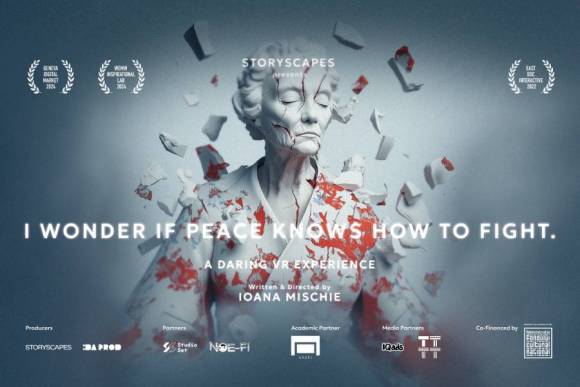Among the 15 innovative projects from around the world selected this year at Geneva Digital Market 2024, the XR Coproduction Session there was as well the only Romanian project, "I wonder if peace knows how to fight", a new VR experience written and directed by Ioana Mischie. The presentation of the project took place last week, in the presence of hundreds of international guests. Meetings with immersive industry professionals, VR co-production and distribution experts are following this year's event. Geneva Digital Market is the only Swiss-hosted event focused on audio-visual innovation, celebrating an anniversary edition this year.
The VR project aims to reverse the gun violence, dehumanization, suffering and loneliness prevalent in digital experiences with empathy, collaboration, curiosity for others, kindness and compassion in the face of adversity. The current immersive project was preceded by projects of the director who wrote immersive history such as Tangible Utopias (the first Romanian project nominated at the European Metaverse Awards, winner of the Open Frame Award) or Human Violins (the first Romanian project selected at Cannes Immersive, Venice Immersive and European XR Awards).
As our societies as confronted with a deep existential crisis, the project advocates for a therapeutic form of tempering human aggression. Within an international context where 171 million people have already experienced virtual reality, "I wonder if peace knows how to fight" wants to answer YES to the question "Can we replace first-person-shooter games, so coveted by the youngsters, with first-person-peace-maker games?” launched by the creator of the project. The player initially enters a universe where violence seems normalized but is then invited to imbue it with restorative elements through his own free will. The significant change the player goes through is meant to make him question the impact of his actions on a small scale and large scale, becoming an open invitation to empathic reconfiguration.
According to studies in the US, we are witnessing a 40% decline in empathy and 48% in perspective-taking among college students over the past three decades. In this context, the multidisciplinary team of Romanian creatives wants to show that there is responsibility and free will in digital worlds and that they can be exponentially augmented in the real world.
"We wanted to create a micro-universe where we can witness the multiplying effect of our emotions, thoughts and actions. The sensory world of "I wonder if peace knows how to fight" is one where aggression can escalate when stimulated by players, but equally active empathy can be met with acts of benevolence and transformative visual vibrancy. Virtual reality gradually becomes a deep inner mirror of our actions. It dematerializes the visible and materializes the invisible. in an almost alchemical way", says Ioana Mischie, director and creator of this project.
The game's structure and cues are masterfully handled in the three acts, each built on specific tools: (1) “Violence” seems normalized and can escalate through chromatics, characters, tonalities; (2) “The choice” confronts the player with all the victims and brings visceral emotions; and (3) “Peace” invited the player to repair the damaged world, coming with atonement through self-corrective actions that can bring people and communities back together. The human vulnerability is captured by configuring the ensemble of characters as porcelain creatures. Any sudden touch can radically influence their destiny. The player's gratification comes tactically, only after he discovers the life stories of his victims.
The VR project aims to methodologically influence the audio-visual environment and give the professional community new storytelling structures. The philosophy underlying this cultural endeavor was theorized in the Cinema Infinit book published in 2020 by UNATC Press and the Imagining Transmedia,book published at MIT in 2024.
The project's transdisciplinary team brings together interactive artists, filmmakers, psychologists, animators, sound artists from the country and abroad. The film team includes exceptional professionals from the audio-visual industry and related fields such as: Ioana Mischie, screenwriter and director, Adrian Tăbăcaru, music composer and interactive artist, Daria Alexandrescu, environment artist, Ruxandra Socor, 3D artist and animator, Ina Bozdog, sound designer, level design consultant Andrei Ivanescu. The website is developed by Iashido, the PR of the project is facilitated by Raluca Mihăilă, financial consultant Cornelia Nastase, legal consultant Oana Crestincov. International consultants include David Nelson (Mixed Reality Lab USC), Allison Crank (UX design).
The "I wonder if peace knows how to fight" project is produced by the Storyscapes Association (Romania). The project partners include the production houses STUDIOSET (Romania) for the sound layers, DAPROD (France) through Jeremy Sahel.
_______________________
The project does not necessarily represent the position of the Administration of the National Cultural Fund. AFCN is not responsible for the content of the project or how the results of the project may be used. These are entirely the responsibility of the beneficiary of the funding.
Initiated in 2012, the STORYSCAPES ASSOCIATION debuted as the first association focused on transmedia storytelling in Romania and has so far created numerous innovative projects, awarded at international festivals, as well as extensive educational and audio-visual research efforts. The association aims to expand the ability to produce transmedia cultural projects that can have a constructive impact on society.
Ioana Mischie is a Romanian filmmaker (screenwriter/director), transmedia pioneer and futurist, multi-awarded for film, VR and innovative concepts. Her artistic projects have been selected at over 250 festivals around the world and awarded by The Webby Awards, SXSW Hackathon, GoEast IFF. Co-founder of the Storyscapes association and university lecturer at UNATC, imagining the world as a neo-creative playground, she believes that storytellers are the "architects of the future" (Buckminster Fuller).




















